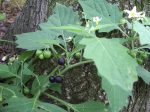 Black nightshade is a native of Europe and Asia but is found in the United States primarily along the West Coast. It is an annual or short-lived perennial that grows in wooded areas as well as disturbed sites such as gardens, pastures, croplands and roadsides. Black nightshade grows well in sun or part shade and particularly enjoys a rich, moist, loamy soil. It is a relative of potato, tomato, eggplant, and peppers and can serve as a host for disease causing organisms that affect them.
Black nightshade is a native of Europe and Asia but is found in the United States primarily along the West Coast. It is an annual or short-lived perennial that grows in wooded areas as well as disturbed sites such as gardens, pastures, croplands and roadsides. Black nightshade grows well in sun or part shade and particularly enjoys a rich, moist, loamy soil. It is a relative of potato, tomato, eggplant, and peppers and can serve as a host for disease causing organisms that affect them.
 Description: Plants grow up to three feet in height on erect, slender, purplish stems that can become woody with age. Low growing branches of young plants hug the ground at first but shoot upward just before flowering. The oval-shaped alternate leaves are green on the upper sides and purplish on the lower side when young but become dark green and sometimes develop toothed margins as they mature. When temperatures are warm clusters of star-shaped flowers are produced with five white petals and conspicuous yellow stamens, giving them a look similar to those of potato and pepper, their vegetable cousins. Green berries that turn black as they age contain 15 to 60 seeds. A mature plant can produce up to 800,000 seeds that can remain viable in the soil for 6 to 8 years or more. The root system is a fibrous, shallow taproot.
Description: Plants grow up to three feet in height on erect, slender, purplish stems that can become woody with age. Low growing branches of young plants hug the ground at first but shoot upward just before flowering. The oval-shaped alternate leaves are green on the upper sides and purplish on the lower side when young but become dark green and sometimes develop toothed margins as they mature. When temperatures are warm clusters of star-shaped flowers are produced with five white petals and conspicuous yellow stamens, giving them a look similar to those of potato and pepper, their vegetable cousins. Green berries that turn black as they age contain 15 to 60 seeds. A mature plant can produce up to 800,000 seeds that can remain viable in the soil for 6 to 8 years or more. The root system is a fibrous, shallow taproot.
Black nightshade is sometimes confused with deadly knightshade (Atropa belladonna) to which it is related but is an entirely different plant. They can be distinguished by the berries; black nightshade’s berries are produced in clusters while those of deadly nightshade are produced singly. Both plants are toxic to humans and livestock but some cultivars of black nightshade have been developed that produce edible ripe berries. Don’t eat the berries of any nightshade in the wild!

 Control: Plants can be easily pulled up, hoed, tilled or mowed before the berries are produced or ripen. In heavily infested areas where other plants are growing mulch can be applied to reduce the germination of seed because the seed buried an inch or more in the soil will not germinate. Various strains of black nightshade are resistant to some traditional herbicides.
Control: Plants can be easily pulled up, hoed, tilled or mowed before the berries are produced or ripen. In heavily infested areas where other plants are growing mulch can be applied to reduce the germination of seed because the seed buried an inch or more in the soil will not germinate. Various strains of black nightshade are resistant to some traditional herbicides.
Photo Credit -Harald-Hubich-Wikipedia.j